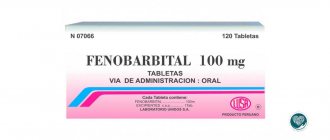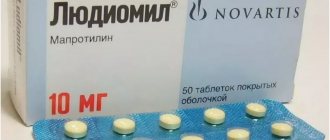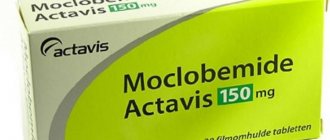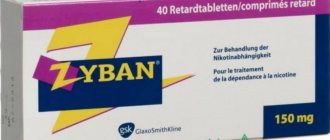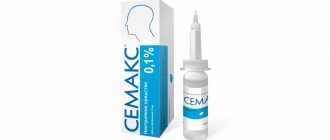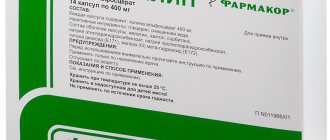Has restrictions during pregnancy
Prohibited during breastfeeding
Has restrictions for children
Prohibited for older people
Allowed for liver problems
Has limitations for kidney problems
For mental disorders, special drugs – antipsychotics – are widely used. These medications also have a sedative and hypnotic effect. Among such drugs, the drug Invega stands out, the composition and properties of which are described in the instructions for use.
General information about the drug
Invega is a popular drug used to treat psychosis. It is produced by a pharmaceutical company (USA).
Drug group, INN, application
The drug belongs to a special drug group - antipsychotic drugs. They are also called antipsychotics. Such drugs affect the central nervous system.
The international nonproprietary name of a drug depends on the active substance that is included in its composition and determines its effect on the body. The INN of the drug Invega is Paliperidone. The scope of application of the drug is psychiatry. It is prescribed for the treatment of various psychotic disorders in adults and adolescents from 12 years of age.
Release form and cost
The drug is available in the form of extended-release tablets. They have a capsule-like shape. Their color and markings differ depending on the content of the active substance:
- 3 mg – white tablets marked PAL 3;
- 6 mg – yellowish color and the inscription PAL 6;
- 9 mg – pinkish and gray tint labeled PAL 9;
- 12 mg – yellow-brown color with the inscription PAL 12.
Advantages of the Invega drug molecule
All tablets are packaged in cell blisters of 7 pieces. A cardboard box contains 28 or 56 tablets. Invega is available with a prescription; its price depends on the content of the active ingredient in 1 tablet and their quantity in the package. Also, the cost may vary depending on where it was purchased. Examples of prices for medicine in different pharmacies in Russian cities:
| Dosage | Name of pharmacy and city | Cost in rubles |
| 9 mg (28 tablets) | Baltika-Med, St. Petersburg | 10 790 |
| 3 mg (28 pieces) | Dialog, Moscow and region | 6736 |
| 3 mg No. 28 | Dialog, Moscow and region | 6874 |
| 3 mg (28 pieces) | GORZDRAV, Moscow | 7082 |
| 9 mg No. 28 | GORZDRAV, Moscow | 9490 |
| 9 mg (28 tablets) | Violet, St. Petersburg | 9998 |
| 6 mg (28 pieces) | Vitamin, St. Petersburg | about 7590 |
This remedy is one of the vitally important drugs. It can only be purchased with a special prescription from the attending psychiatrist.
Indications and restrictions for taking Invega
The drug is a potent drug, so it should be taken only if there are special indications. Among them:
- Treatment of schizophrenia. The medicine is prescribed in the acute stage for both children and adults.
- Prevention of schizophrenic exacerbations.
- Treatment of schizoaffective disorders. In this case, the drug is used as the main medicine or as part of complex therapy together with mood stabilizers and antidepressants.
Dosage regimen
The only significant contraindication is individual intolerance to the active and auxiliary components of the drug. The drug is not prescribed to children under 12 years of age due to the lack of data on its safety and effectiveness.
There are a number of restrictions under which its use is permitted, but with extreme caution:
- tendency to seizures;
- narrowing of the lumen of the digestive tract (high risk of obstruction);
- dysphagia (impaired swallowing ability);
- old age (especially in combination with dementia);
- parkinsonism (tendency to develop side effects, including neuroleptic malignant syndrome).
During pregnancy, it is possible to use the medicine, but only in cases of extreme necessity, when the benefit to the mother is higher than the potential risk to the fetus. It is better for nursing mothers not to take it, since paliperidone can pass into breast milk and have a negative effect on the baby (sedation, hypotension and other disorders).
Invega®
ZNS
It is known that antipsychotic drugs, including paliperidone, can cause NMS, which is characterized by hyperthermia, muscle rigidity, instability of the autonomic nervous system, depression of consciousness, and increased serum concentrations of CPK. Myoglobinuria (rhabdomyolysis) and acute renal failure may also occur in patients with NMS. If a patient experiences objective or subjective symptoms of NMS, all antipsychotic medications, including paliperidone, should be immediately discontinued.
Tardive dyskinesia
Drugs with dopamine receptor antagonist properties can cause tardive dyskinesia, which is characterized by rhythmic involuntary movements, mainly of the tongue and/or facial muscles. If a patient experiences objective or subjective symptoms indicating tardive dyskinesia, discontinuation of all antipsychotic medications, including paliperidone, should be considered.
QT prolongation
As with other antipsychotics, caution should be exercised when prescribing Invega® to patients with a history of arrhythmia, congenital prolongation of the QT interval, and concomitant use with drugs that prolong the QT interval.
Hyperglycemia and diabetes mellitus
Hyperglycemia, diabetes mellitus and exacerbation of existing diabetes mellitus were observed during treatment with Invega®. Establishing a relationship between the use of atypical antipsychotic drugs and disorders of glucose metabolism is complicated by the increased risk of developing diabetes mellitus in patients with schizophrenia and the prevalence of diabetes mellitus in the general population. Given these factors, the relationship between the use of atypical antipsychotic drugs and the development of side effects associated with hyperglycemia is not fully established. In patients diagnosed with diabetes mellitus, glucose levels should be regularly monitored. Patients with risk factors for diabetes mellitus (eg, obesity, family history of diabetes) should have fasting blood glucose levels monitored at the start of treatment and periodically during treatment. All patients should be clinically monitored for symptoms of hyperglycemia and diabetes mellitus. Patients who develop symptoms of hyperglycemia while being treated with atypical antipsychotics should have their blood glucose levels monitored. In some cases, symptoms of hyperglycemia have resolved with discontinuation of atypical antipsychotic medications, but some patients require antidiabetic treatment despite discontinuation of the drug.
Weight gain
Significant weight gain was observed during treatment with atypical antipsychotics. It is necessary to monitor patients' body weight.
Hyperprolactinemia
Like other dopamine D2 receptor antagonists, paliperidone increases prolactin levels and this increase persists throughout drug administration. The effect of paliperidone is comparable to that of risperidone, the drug with the greatest effect on prolactin levels among other antipsychotic drugs.
Hyperprolactinemia, regardless of etiology, can suppress the expression of GnRH from the hypothalamus, which leads to a decrease in the secretion of gonadotropins by the pituitary gland. This, in turn, can suppress reproductive function, reducing sexual steroidogenesis in women and men. Galactorrhea, amenorrhea, gynecomastia and impotence have been reported in patients taking drugs that increase prolactin levels. Long-term hyperprolactinemia associated with hypogonadism can lead to decreased bone density in women and men.
In vitro tissue culture studies have shown that approximately 1/3 of human breast cancers are prolactin-dependent. This should be taken into account when prescribing drugs that increase prolactin levels to patients with previously diagnosed breast cancer.
Clinical and epidemiological studies conducted to date have shown no association between atypical antipsychotic drugs and tumor formation in humans. However, the available data are too limited to draw definitive conclusions.
Orthostatic hypotension
Paliperidone has alpha-blocking activity and may therefore cause orthostatic hypotension in some patients. Paliperidone should be used with caution in patients with cardiovascular diseases (for example, heart failure, myocardial infarction or ischemia, cardiac conduction disorders), cerebrovascular diseases, as well as conditions that contribute to the development of arterial hypotension (for example, dehydration, hypovolemia and therapy with antihypertensive drugs). drugs).
Body temperature regulation
Antipsychotic drugs are associated with such undesirable effects as disruption of the body's ability to regulate temperature. Caution should be exercised when prescribing paliperidone to patients with conditions that may contribute to an increase in core body temperature, which include intense physical activity, dehydration, exposure to high external temperatures, and concomitant use of drugs with anticholinergic activity.
Antiemetic effect
Preclinical studies have demonstrated the antiemetic effect of paliperidone. This effect, when observed in humans, may mask objective and subjective symptoms of overdose of some drugs, as well as diseases such as intestinal obstruction, Reye's syndrome, and brain tumors.
Priapism
Drugs with alpha-blocking effects can cause priapism. Priapism has been reported in post-marketing studies of paliperidone.
Suicide attempts
The possibility of suicide attempts is characteristic of mental illness, so treatment of patients at high risk should be carried out under close supervision. In these cases, Invega® should be prescribed in a minimum number of tablets to reduce the risk of overdose.
Leukopenia, neutropenia, agranulocytosis
Leukopenia, neutropenia and agranulocytosis were observed with the use of antipsychotics, incl. when using the drug Invega®. Agranulocytosis has been observed very rarely during post-marketing surveillance. In patients with a history of a clinically significant decrease in the white blood cell count or drug-related leukopenia/neutropenia, a complete blood count is recommended during the first months of therapy; discontinuation of treatment with Invega should be considered at the first clinically significant decrease in the white blood cell count in the absence of other possible causes. Patients with clinically significant neutropenia are advised to be monitored for fever or symptoms of infection and to initiate treatment immediately if such symptoms occur. Patients with severe neutropenia (absolute neutrophil count less than 1 x 109/L) should discontinue use of Invega® until the white blood cell count normalizes.
Venous thromboembolism
Cases of venous thromboembolism have been reported with the use of antipsychotic drugs. Since patients taking antipsychotic drugs are often at risk of developing venous thromboembolism, all possible risk factors should be identified before and during treatment with Invega® and preventive measures should be taken.
Intraoperative floppy iris syndrome (ISID)
ISDR was observed during surgery for the presence of cataracts in patients receiving therapy with drugs of the α1-adrenergic receptor antagonist group. ISDR increases the risk of complications associated with the organ of vision during and after surgery. The doctor performing such an operation should be informed in advance that the patient has taken or is currently taking drugs that have α1-adrenergic receptor antagonist activity.
The potential benefit of discontinuing α1-adrenergic antagonist therapy before surgery has not been established and should be weighed against the risks associated with discontinuing antipsychotic therapy.
Conditions leading to a decrease in the presence of the drug in the gastrointestinal tract
Conditions leading to a decrease in the presence of the drug in the gastrointestinal tract, for example, diseases associated with chronic diarrhea, may cause a decrease in the absorption of paliperidone.
Invega® tablets are manufactured using osmotic release technology, in which osmotic pressure releases paliperidone at a controlled rate. The system, which looks like a capsule-shaped tablet, consists of an osmotically active three-layer core surrounded by an intermediate shell and a semi-permeable membrane. The three-layer core consists of two medicinal layers containing the drug substance and excipients, as well as an ejector layer containing osmotically active components. The dome of the drug layers has two laser-cut outlets. In the gastrointestinal tract, the colored shell quickly dissolves, and water begins to enter the tablet through a semi-permeable membrane. The membrane controls the level of water influx, and this, in turn, controls the degree of drug release.
The hydrophilic polymers in the tablet core absorb water and swell into a gel containing paliperidone, which is then expelled through holes in the dome. The insoluble components of the tablet are excreted from the body in the stool. Patients should not be concerned if they notice something that looks like a pill in their stool. .
Alcohol consumption
Patients should avoid drinking alcohol during treatment with Invega®.
Impact on the ability to drive vehicles and operate machinery
Paliperidone may impair the ability to perform activities requiring rapid mental reaction, as well as cause visual effects, so patients should refrain from driving or operating machinery until their individual sensitivity to the drug has been established.
Instructions for use
The drug is intended for internal use. The tablets should be swallowed whole with liquid. They are not recommended to be chewed or crushed. The dosage regimen depends on the pathology and age of the patient:
- For adults, the drug is prescribed for schizophrenia and affective disorders. The recommended dose is 6 mg. It is taken once a day. Eating does not affect the activity of the drug. In some cases, a dose reduction or increase is required. The dosage should be increased gradually, by 3 mg every 5 days.
Start of therapy - Adolescents from the age of 12 are prescribed medication to treat schizophrenia. Their daily dose ranges from 3 to 12 mg. You should start with lower doses. Increasing the dose leads to increased therapeutic effect.
If older people do not have kidney problems, then they do not need to reduce the dose. But it is important to be careful when treating patients with dementia and stroke risk.
special instructions
It is important to be careful when taking the drug. His special instructions:
- When using the drug, there is a risk of neuroleptic malignant syndrome. Therefore, if its signs appear (rigidity, central nervous system depression, increased body temperature), the drug should be discontinued.
- It is not recommended to use the medicine for children under 12 years of age, elderly people over 65 years of age, pregnant women, and nursing mothers.
Tolerability and safety of the drug - If signs of dyskinesia appear, the drug should be discontinued.
- Taking the medication may lead to hyperglycemia. This should be taken into account when prescribing medication to patients with diabetes.
- The drug provokes an increase in prolactin levels, which leads to sexual dysfunction in men and women and suppression of reproductive function.
- Treatment with the drug provokes weight gain. Therefore, the patient's weight should be constantly monitored.
The drug Invega causes side effects that affect alertness and reaction speed. Therefore, while taking it, you should not drive a vehicle or operate machinery that requires increased concentration.
Invega
Use during pregnancy and breastfeeding
Currently, there is no data on the safety of paliperidone during pregnancy in women and its effect on the intrauterine development of the fetus.
The drug can be used in pregnant women only in cases of extreme necessity, when the expected benefit to the mother outweighs the potential risk to the fetus. The effect of paliperidone on labor in women is not known.
The patient should notify her doctor of pregnancy or planning to become pregnant during treatment with Invega®.
If a woman took antipsychotic drugs (including paliperidone) in the third trimester of pregnancy, the newborns are at risk of extrapyramidal disorders and/or withdrawal syndrome of varying severity. These symptoms may include agitation, hypertension, hypotonia, tremor, somnolence, respiratory distress, and feeding problems. Therefore, special monitoring of newborns is necessary. If interruption of treatment during pregnancy is required, the dose should be reduced gradually.
Paliperidone is excreted in breast milk in clinically significant concentrations, so the drug should not be prescribed during lactation.
Use for liver dysfunction
Patients with impaired liver function do not require dose reduction.
Use for renal impairment
For patients with moderate or severe renal impairment (creatinine clearance <50 ml/min), the recommended dose of the drug is 3 mg 1 time/day.
Use in children
The effectiveness and safety of Invega® for the treatment of schizophrenia in children under 12 years of age has not been studied. The effectiveness and safety of Invega® for the treatment of schizoaffective disorders in patients under 18 years of age has not been studied.
Use in elderly patients
For elderly patients with normal renal function (creatinine clearance ≥80 ml/min), the same doses of the drug are recommended as for adult patients with normal renal function. However, in elderly patients, renal function may be reduced, in which case the dose of the drug should be adjusted according to the renal function of the individual patient.
special instructions
ZNS
It is known that antipsychotic drugs, including paliperidone, can cause NMS, which is characterized by hyperthermia, muscle rigidity, instability of the autonomic nervous system, depression of consciousness, and increased serum concentrations of CPK. Myoglobinuria (rhabdomyolysis) and acute renal failure may also occur in patients with NMS. If a patient experiences objective or subjective symptoms of NMS, all antipsychotic medications, including paliperidone, should be immediately discontinued.
Tardive dyskinesia
Drugs with dopamine receptor antagonist properties can cause tardive dyskinesia, which is characterized by rhythmic involuntary movements, mainly of the tongue and/or facial muscles. If a patient experiences objective or subjective symptoms indicating tardive dyskinesia, discontinuation of all antipsychotic medications, including paliperidone, should be considered.
QT prolongation
As with other antipsychotics, caution should be exercised when prescribing Invega® to patients with a history of arrhythmia, congenital prolongation of the QT interval, and concomitant use with drugs that prolong the QT interval.
Hyperglycemia and diabetes mellitus
Hyperglycemia, diabetes mellitus and exacerbation of existing diabetes mellitus were observed during treatment with Invega®. Establishing a relationship between the use of atypical antipsychotic drugs and disorders of glucose metabolism is complicated by the increased risk of developing diabetes mellitus in patients with schizophrenia and the prevalence of diabetes mellitus in the general population. Given these factors, the relationship between the use of atypical antipsychotic drugs and the development of side effects associated with hyperglycemia is not fully established. In patients diagnosed with diabetes mellitus, glucose levels should be regularly monitored. Patients with risk factors for diabetes mellitus (eg, obesity, family history of diabetes) should have fasting blood glucose levels monitored at the start of treatment and periodically during treatment. All patients should be clinically monitored for symptoms of hyperglycemia and diabetes mellitus. Patients who develop symptoms of hyperglycemia while being treated with atypical antipsychotics should have their blood glucose levels monitored. In some cases, symptoms of hyperglycemia have resolved with discontinuation of atypical antipsychotic medications, but some patients require antidiabetic treatment despite discontinuation of the drug.
Weight gain
Significant weight gain was observed during treatment with atypical antipsychotics. It is necessary to monitor patients' body weight.
Hyperprolactinemia
Like other dopamine D2 receptor antagonists, paliperidone increases prolactin levels and this increase persists throughout drug administration. The effect of paliperidone is comparable to that of risperidone, the drug with the greatest effect on prolactin levels among other antipsychotic drugs.
Hyperprolactinemia, regardless of etiology, can suppress the expression of GnRH from the hypothalamus, which leads to a decrease in the secretion of gonadotropins by the pituitary gland. This, in turn, can suppress reproductive function, reducing sexual steroidogenesis in women and men. Galactorrhea, amenorrhea, gynecomastia and impotence have been reported in patients taking drugs that increase prolactin levels. Long-term hyperprolactinemia associated with hypogonadism can lead to decreased bone density in women and men.
In vitro tissue culture studies have shown that approximately 1/3 of human breast cancers are prolactin-dependent. This should be taken into account when prescribing drugs that increase prolactin levels to patients with previously diagnosed breast cancer.
Clinical and epidemiological studies conducted to date have shown no association between atypical antipsychotic drugs and tumor formation in humans. However, the available data are too limited to draw definitive conclusions.
Orthostatic hypotension
Paliperidone has alpha-blocking activity and may therefore cause orthostatic hypotension in some patients. Paliperidone should be used with caution in patients with cardiovascular diseases (for example, heart failure, myocardial infarction or ischemia, cardiac conduction disorders), cerebrovascular diseases, as well as conditions that contribute to the development of arterial hypotension (for example, dehydration, hypovolemia and therapy with antihypertensive drugs). drugs).
Body temperature regulation
Antipsychotic drugs are associated with such undesirable effects as disruption of the body's ability to regulate temperature. Caution should be exercised when prescribing paliperidone to patients with conditions that may contribute to an increase in core body temperature, which include intense physical activity, dehydration, exposure to high external temperatures, and concomitant use of drugs with anticholinergic activity.
Antiemetic effect
Preclinical studies have demonstrated the antiemetic effect of paliperidone. This effect, when observed in humans, may mask objective and subjective symptoms of overdose of some drugs, as well as diseases such as intestinal obstruction, Reye's syndrome, and brain tumors.
Priapism
Drugs with alpha-blocking effects can cause priapism. Priapism has been reported in post-marketing studies of paliperidone.
Suicide attempts
The possibility of suicide attempts is characteristic of mental illness, so treatment of patients at high risk should be carried out under close supervision. In these cases, Invega® should be prescribed in a minimum number of tablets to reduce the risk of overdose.
Leukopenia, neutropenia, agranulocytosis
Leukopenia, neutropenia and agranulocytosis were observed with the use of antipsychotics, incl. when using the drug Invega®. Agranulocytosis has been observed very rarely during post-marketing surveillance. In patients with a history of a clinically significant decrease in the white blood cell count or drug-related leukopenia/neutropenia, a complete blood count is recommended during the first months of therapy; discontinuation of treatment with Invega should be considered at the first clinically significant decrease in the white blood cell count in the absence of other possible causes. Patients with clinically significant neutropenia are advised to be monitored for fever or symptoms of infection and to initiate treatment immediately if such symptoms occur. Patients with severe neutropenia (absolute neutrophil count less than 1 x 109/L) should discontinue use of Invega® until the white blood cell count normalizes.
Venous thromboembolism
Cases of venous thromboembolism have been reported with the use of antipsychotic drugs. Since patients taking antipsychotic drugs are often at risk of developing venous thromboembolism, all possible risk factors should be identified before and during treatment with Invega® and preventive measures should be taken.
Intraoperative floppy iris syndrome (ISID)
ISDR was observed during surgery for the presence of cataracts in patients receiving therapy with drugs of the α1-adrenergic receptor antagonist group. ISDR increases the risk of complications associated with the organ of vision during and after surgery. The doctor performing such an operation should be informed in advance that the patient has taken or is currently taking drugs that have α1-adrenergic receptor antagonist activity.
The potential benefit of discontinuing α1-adrenergic antagonist therapy before surgery has not been established and should be weighed against the risks associated with discontinuing antipsychotic therapy.
Conditions leading to a decrease in the presence of the drug in the gastrointestinal tract
Conditions leading to a decrease in the presence of the drug in the gastrointestinal tract, for example, diseases associated with chronic diarrhea, may cause a decrease in the absorption of paliperidone.
Invega® tablets are manufactured using osmotic release technology, in which osmotic pressure releases paliperidone at a controlled rate. The system, which looks like a capsule-shaped tablet, consists of an osmotically active three-layer core surrounded by an intermediate shell and a semi-permeable membrane. The three-layer core consists of two medicinal layers containing the drug substance and excipients, as well as an ejector layer containing osmotically active components. The dome of the drug layers has two laser-cut outlets. In the gastrointestinal tract, the colored shell quickly dissolves, and water begins to enter the tablet through a semi-permeable membrane. The membrane controls the level of water influx, and this, in turn, controls the degree of drug release.
The hydrophilic polymers in the tablet core absorb water and swell into a gel containing paliperidone, which is then expelled through holes in the dome. The insoluble components of the tablet are excreted from the body in the stool. Patients should not worry if they notice something that looks like a pill in their stool.
Alcohol consumption
Patients should avoid drinking alcohol during treatment with Invega®.
Impact on the ability to drive vehicles and operate machinery
Paliperidone may impair the ability to perform activities requiring rapid mental reaction, as well as cause visual effects, so patients should refrain from driving or operating machinery until their individual sensitivity to the drug has been established.
Side effects and symptoms of overdose
The drug is a potent drug, so its use may lead to the development of negative reactions. Among them:
- dizziness and headache;
- extrapyramidal anomalies;
- dystonia;
- general weakness, lethargy;
- sedation;
- dyskinesia;
- trembling of limbs;
Parkinsonismdevelopment of parkinsonism;
- visual impairment;
- cardiac disorders (tachycardia, arrhythmia, heart block);
- orthostatic hypotension;
- attacks of vomiting, decreased salivation, abdominal pain, intestinal obstruction;
- pancreatitis, jaundice;
- asthenic syndrome;
- weight gain;
- infections of the nose and throat (nasopharyngitis);
- mental disorders (fear, anxiety, excessive excitability);
- nosebleeds;
- decreased sexual activity, desire, amenorrhea in women and impotence in men;
- urinary incontinence or retention;
- allergic reactions on the skin (redness, itching, burning, urticaria, erythema);
- nasal congestion, cough, shortness of breath;
- pain in muscles and bones, back, muscle spasms;
- angioedema.
When taking high doses, increased side effects are observed. Main symptoms of overdose:
- drowsiness;
- sedation;
- increased heart rate;
- decrease in blood pressure.
Advantages of Invega
Treatment is carried out in a hospital setting. First, the patient's stomach is washed and laxatives and sorbents are given. There is no specific antidote for paliperidone. Therefore, symptomatic therapy is prescribed. At the same time, it is important to control the vital functions of the body.
Invega, 28 pcs., 3 mg, extended-release, film-coated tablets
ZNS. It is known that antipsychotic drugs, including paliperidone, can cause NMS, which is characterized by hyperthermia, muscle rigidity, instability of the autonomic nervous system, depression of consciousness, and increased serum concentrations of CPK. Myoglobinuria (rhabdomyolysis) and acute renal failure may also occur in patients with NMS. If a patient experiences objective or subjective symptoms of NMS, all antipsychotic medications, including paliperidone, should be immediately discontinued.
Tardive dyskinesia. Drugs with dopamine receptor antagonist properties can cause tardive dyskinesia, which is characterized by rhythmic involuntary movements, mainly of the tongue and/or facial muscles. If a patient experiences objective or subjective symptoms indicating tardive dyskinesia, the advisability of discontinuing all antipsychotic drugs, including paliperidone, should be considered.
Prolongation of the QT interval. As with other antipsychotics, caution should be exercised when prescribing Invega ® to patients with a history of cardiac arrhythmias, congenital prolongation of the QT interval, and concomitant use with drugs that prolong the QT interval.
Hyperglycemia and diabetes mellitus. Hyperglycemia, diabetes mellitus and exacerbation of existing diabetes mellitus were observed during treatment with Invega ®. Establishing a relationship between the use of atypical antipsychotic drugs and disorders of glucose metabolism is complicated by the increased risk of developing diabetes mellitus in patients with schizophrenia and the prevalence of diabetes mellitus in the general population. Given these factors, the relationship between the use of atypical antipsychotic drugs and the development of adverse effects associated with hyperglycemia is not fully established. In patients diagnosed with diabetes mellitus, glucose levels should be regularly monitored. Patients with risk factors for diabetes mellitus (eg, obesity, family history of diabetes) should have fasting blood glucose levels monitored at the start of treatment and periodically during treatment. All patients should be clinically monitored for symptoms of hyperglycemia and diabetes mellitus. Patients who develop symptoms of hyperglycemia while being treated with atypical antipsychotics should have their blood glucose levels monitored. In some cases, symptoms of hyperglycemia have resolved with discontinuation of atypical antipsychotic medications, but some patients require antidiabetic treatment despite discontinuation of the drug.
Increase in body weight. Significant weight gain was observed during treatment with atypical antipsychotics. It is necessary to monitor patients' body weight.
Hyperprolactinemia. Like other D2-dopamine receptor antagonists, paliperidone increases prolactin levels, and this increase persists throughout drug administration. The effects of paliperidone are comparable to those of risperidone, the drug that has the greatest effect on prolactin levels among other antipsychotic drugs. Hyperprolactinemia, regardless of etiology, can suppress the expression of GnRH in the hypothalamus, which leads to a decrease in the secretion of gonadotropins by the pituitary gland. This in turn can suppress reproductive function, weakening sexual steroidogenesis in women and men. Galactorrhea, amenorrhea, gynecomastia and impotence have been reported in patients taking drugs that increase prolactin levels. Long-term hyperprolactinemia associated with hypogonadism can lead to decreased bone density in women and men.
In vitro tissue culture studies have shown that approximately one third of human breast cancers are prolactin-dependent. This should be taken into account when prescribing drugs that increase prolactin levels to patients with previously diagnosed breast cancer. Clinical and epidemiological studies conducted to date have shown no association between atypical antipsychotic drugs and tumor formation in humans. However, the available data are too limited to draw definitive conclusions.
Orthostatic hypotension. Paliperidone has α-blocking activity and may therefore cause orthostatic hypotension in some patients. Paliperidone should be used with caution in patients with cardiovascular disease (for example, heart failure, myocardial infarction or ischemia, cardiac conduction disorders), cerebrovascular disease, and with conditions that contribute to arterial hypotension (for example, dehydration, hypovolemia and therapy with antihypertensive drugs).
Regulation of body temperature. Antipsychotic drugs are associated with such undesirable effects as disruption of the body's ability to regulate temperature. Caution should be exercised when prescribing paliperidone to patients with conditions that may contribute to an increase in core body temperature, including intense exercise, dehydration, exposure to high external temperatures, or concomitant use of drugs with anticholinergic activity.
Antiemetic effect. Preclinical studies have demonstrated the antiemetic effect of paliperidone. This effect, when observed in humans, may mask objective and subjective symptoms of overdose of some drugs, as well as diseases such as intestinal obstruction, Reye's syndrome, and brain tumors.
Priapism. Drugs with α-adrenergic blocking effects can cause priapism. Priapism has been reported in post-marketing studies of paliperidone.
Suicidal attempts. The possibility of suicide attempts is characteristic of mental illness, so treatment of patients at high risk should be carried out under close supervision. In these cases, Invega ® should be prescribed in a minimum number of tablets to reduce the risk of overdose.
Leukopenia, neutropenia, agranulocytosis. Leukopenia, neutropenia and agranulocytosis were observed with the use of antipsychotics, incl. when using the drug Invega ® . Agranulocytosis has been observed very rarely during post-marketing surveillance. In patients with a history of clinically significant decreases in white blood cell count or drug-dependent leukopenia/neutropenia, a complete blood count is recommended during the first months of therapy; Discontinuation of treatment with Invega should be considered at the first clinically significant decrease in the white blood cell count in the absence of other possible causes. Patients with clinically significant neutropenia are advised to be monitored for fever or symptoms of infection and to initiate treatment immediately if such symptoms occur. Patients with severe neutropenia (absolute neutrophil count less than 1·10 9 /l) should stop using Invega ® until the white blood cell count returns to normal.
Venous thromboembolism. Cases of venous thromboembolism have been reported with the use of antipsychotic drugs. Since patients taking antipsychotic drugs are often at risk of developing venous thromboembolism, all possible risk factors should be identified before and during treatment with Invega ® and preventive measures taken.
Intraoperative floppy iris syndrome (ISID). ISDR was observed during surgery for the presence of cataracts in patients receiving therapy with drugs from the group of α 1 -adrenergic receptor antagonists. ISDR increases the risk of complications associated with the organ of vision during and after surgery. The doctor performing such an operation must be informed in advance that the patient has taken or is currently taking drugs that have α 1-adrenergic receptor antagonist activity. The potential benefit of discontinuing α 1 -adrenergic antagonist therapy before surgery has not been established and should be weighed against the risks associated with discontinuing antipsychotic therapy.
Pregnancy and child care. The patient should notify his or her physician of pregnancy or planning to become pregnant during treatment with Invega ® . Caution should be exercised when prescribing Invega ® to nursing mothers (see “Use during pregnancy and lactation”).
Alcohol consumption. Patients should avoid drinking alcohol during treatment with Invega ® .
Conditions leading to a decrease in the presence of the drug in the gastrointestinal tract. Conditions that reduce the presence of the drug in the gastrointestinal tract, such as diseases associated with chronic diarrhea, may cause a decrease in the absorption of paliperidone.
Invega ® tablets are manufactured using osmotic release technology, in which osmotic pressure releases paliperidone at a controlled rate. The system, which looks like a capsule-shaped tablet, consists of an osmotically active three-layer core surrounded by an intermediate shell and a semi-permeable membrane. The three-layer core consists of two medicinal layers containing the drug substance and excipients, as well as an ejector layer containing osmotically active components. On the dome side of the drug layers there are two outlet holes made using a laser. In the gastrointestinal tract, the colored shell quickly dissolves, and water begins to flow into the tablet through a semi-permeable control membrane. The membrane controls the level of water intake, and this in turn controls the level of drug release.
The hydrophilic polymers in the tablet core absorb water and swell into a gel containing paliperidone, which is then expelled through holes in the dome. The insoluble components of the tablet are excreted from the body in the stool. Patients should not worry if they notice something that looks like a pill in their stool.
Influence on driving a car and working with machinery. Paliperidone may interfere with activities requiring rapid mental response and may also have visual effects, so patients should avoid driving or operating machinery until their individual sensitivity to paliperidone has been established.
Drug interactions and similar products
Since paliperidone is practically not metabolized in the liver, it does not take part in pharmacokinetic interactions with drugs that are metabolized by isoenzymes of the cytochrome P 450 system. The drug can reduce the therapeutic effect of levodopa and other dopamine agonists.
Invega medication should be combined with caution with drugs that depress the central nervous system, as well as with alcohol. This may lead to increased negative reactions associated with the effects on the brain.
There are many drugs that have antipsychotic properties. The most popular analogues of Inveg:
- Haloperidol. This is a neuroleptic drug based on the substance haloperidone. It is prescribed as a sedative for psychomotor agitation due to psychosis in the manic stage, dementia, schizophrenia and alcoholism.
It is also used to treat psychoses with hallucinations, paranoid and delusional states, aggression, and behavioral disorders. It has many contraindications and side effects, so it is taken under medical supervision.
Azaleptin. This is a medicine that contains clozapine. Has antipsychotic, sedative properties. It is prescribed for schizophrenia, manic and manic-depressive states, psychomotor agitation.
As a rule, it is taken in case of resistance to therapy with other antipsychotics. Contraindicated in patients with intolerance to components, suppression of hematopoiesis, alcoholic and toxic psychoses, epilepsy, disorders of the cardiac and respiratory systems.
- Sulpiride pilyule_nervi-369. This drug belongs to the classical antipsychotics from the group of substituted benzamides. It also has antidepressant properties. Has an antiemetic effect. The drug is prescribed for the short-term treatment of symptoms of anxiety when other remedies have not given the desired result.
It can also be used to treat anxiety and self-harm in children over 6 years of age, especially if they have autism syndrome. It has serious contraindications that should be taken into account before prescribing it.
Only the attending physician can prescribe a particular antipsychotic. Self-medication can lead to negative reactions and complications.
